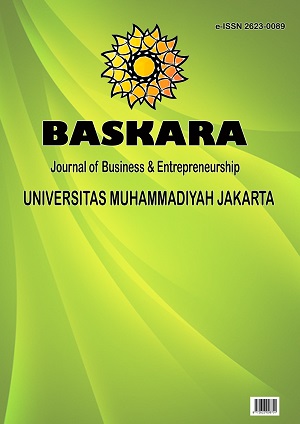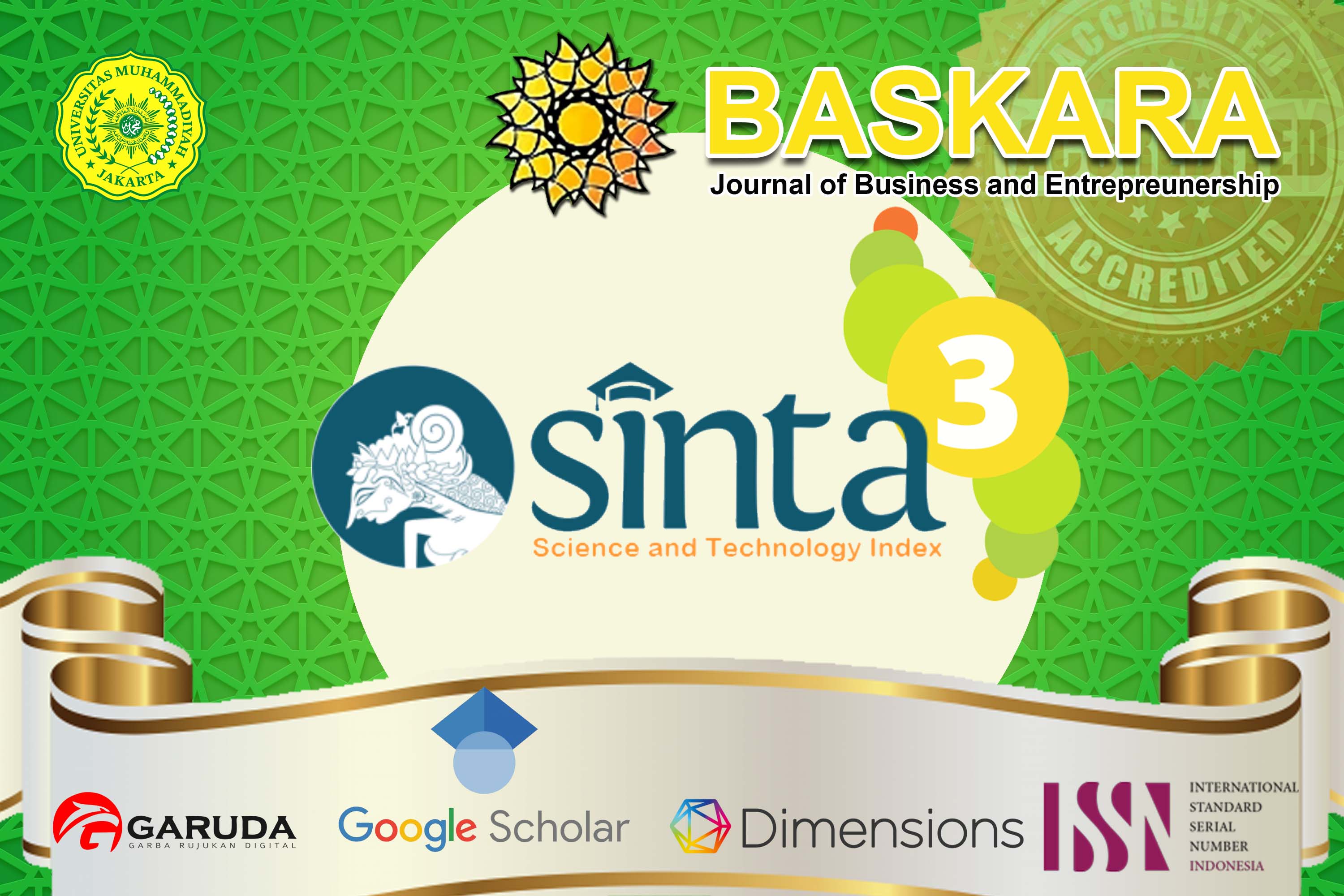Informal Cross-Border Trade: Malaysia-Indonesia Borders The Conceptualisation From ‘Authority-Defined’ To "Everyday-Defined"
DOI:
https://doi.org/10.54268/baskara.v5i1.14046Keywords:
Borders, authority-defined, everyday-defined, Border tradeAbstract
For these border studies, understanding borderlanders provides a new narrative about boundaries. The history of a nation-state of a collective nature, the alignment of power, economic segmentation, and integration of culture, ethnicity, and identity, religion, the behavior of marginal communities, as well as modern socio-political segregation are variables that can be raised in various disciplines. In this study, we offer a qualitative method with an ethnographic perspective, as many anthropologists do, but with a constructivist approach. We call it the conceptualization of "Authority-Defined" to "Everyday-Defined." The diversity of narratives and connotations in unraveling boundaries gives the perspective of contextual interpretation in different positions. Surely, understanding boundaries should also be seen in such a detailed context that the actors of border studies, i.e., society, are observed through the lens of meaning boundaries in their everyday lives. These differences lead to findings that are rich in dynamic and varied border backgrounds. This discussion focused on on-the-ground findings about informal cross-border trade, specifically at the Malaysia-Indonesia border. A trading system built by local communities is certainly different from the trade system in non-border areas and even in the country's capital area.References
Bojcun M. (2016). Tatiana Zhurzhenko, Borderlands into Bordered Lands. Geopolitics of Identity in Post-Soviet Ukraine. Debate: Journal of Contemporary Central and Eastern Europe 19 (1-2): 522-524.
Boon-Thong, L., & Bahrin, T. S. (2019). Vanishing borders: the new international order of the 21st century. Routledge.
Boon-Thong, L., & Bahrin, T. S. (2019). Vanishing borders: the new international order of the 21st century. Routledge.
Gilles, P., Koff, H., Maganda, C., & Schulz, C. (2013). Theorizing borders through analyses of power relationships. PIE Peter Lang Brussels.
Hun, P. G., & Kaur, C. (2014). Identiti etnik minoriti di Malaysia: Antara realiti sosial tafsiran autoriti dan tafsiran harian. Akademika, 84(1&2), 57–70.
Ishikawa, N. (2012). Between frontiers: nation and identity in a Southeast Asian borderland. Ohio University Press.
Kolossov, V., & Scott, J. (2013). Selected conceptual issues in border studies. Belgeo. Revue Belge de Géographie, 1.
Kramsch, O. T. (2013). Regulating European borders: a cultural perspective. Veggeland, N.(Ed.), Innovative Regulatory Approaches: Coping with Scandinavian and European Union Policies, 71–84.
Lee, S. K. (2015). Behind the scenes: Smuggling in the Thailand-Myanmar borderland. Pacific Affairs, 88(4), 767–790.
Maity, R., & Sandhu, S. K. (n.d.). The Impact of Social Media on Online Purchasing Behaviour of Consumers: An Empirical Study of Youth in West Bengal, India. Malaysian Journal of Consumer and Family Economics, 26–42.
McCall, C. (2013). European Union cross-border cooperation and conflict amelioration. Space and Polity, 17(2), 197–216.
Murphy, A. B. (2013). Intersecting geographies of institutions and sovereignty. In Oxford Research Encyclopedia of International Studies.
Mwakisale, L., & Magai, P. S. (2015). Involvement in informal cross border trade: A case of women entrepreneurs in Tanzania.
Newman, D. (2016). Contemporary research agendas in border studies: An overview. The Routledge Research Companion to Border Studies, 55–70.
Paasi, A. (2014). Border studies reanimated: going beyond the territorial/relational divide. Environment and Planning A, 44(10), 2303–2309.
Pierce, P. B., & Boyle, B. H. (2015). Boyle : The Ideal Clinic.
Rudiatin, E. (2018a). Border Trade Agreement dan Integrasi Ekonomi di Perbatasan. Prosiding, 60.
Rudiatin, E. (2018b). Malayndonesia: Integrasi ekonomi di Perbatasan Indonesia-Malaysia: Sebatik Kalimantan Utara-Tawau Sabah. Bening Era.
Shamsul, A. B. (2015). Politics of Language and Language of Politics: Theory and Practice of the Nation of Intent as articulated in Malaysia. UKM Ethnic Studies Paper Series No. 35 (June).
Sarjono, F. (2018). EKONOMI TIDAK FORMAL DAN DINAMIKA PERBURUHAN DI SEMPADAN MALAYSIA ÂINDONESIA: KAJIAN KES DI PULAU SEBATIK. Jurnal Kinabalu.
Vogeler, I. (2015). Types of international borders along the US-Mexico border. Geography Online, 10(1), 1–6.
Wille, C., Gerst, D., & Krämer, H. (2021). Identities and Methodologies of Border Studies: Recent Empirical and Conceptual Approaches. Borders in Perspective, 6, 126.
Gilles, P., Koff, H., Maganda, C., & Schulz, C. (2013). Theorizing borders through analyses of power relationships. PIE Peter Lang Brussels.
Downloads
Published
Issue
Section
License
In order for Baskara: Journal of Business and Entrepreneurship to publish and disseminate research articles, we need publishing rights (transfered from author(s) to publisher). This is determined by a publishing agreement between the Author(s) and Baskara Journal. This agreement deals with the transfer or license of the copyright of publishing to Baskara: Journal of Business and Entrepreneurship, while Authors still retain significant rights to use and share their own published articles. Baskara : Journal of Business and Entrepreneurship supports the need for authors to share, disseminate and maximize the impact of their research and these rights, in any databases.
As a journal Author, you have rights for a large range of uses of your article, including use by your employing institute or company. These Author rights can be exercised without the need to obtain specific permission. Authors publishing in Baskara : Journal of Business and Entrepreneurship have wide rights to use their works for teaching and scholarly purposes without needing to seek permission, including:
- use for classroom teaching by Author or Author's institution and presentation at a meeting or conference and distributing copies to attendees;
- use for internal training by author's company;
- distribution to colleagues for their reseearch use;
- use in a subsequent compilation of the author's works;
- inclusion in a thesis or dissertation;
- reuse of portions or extracts from the article in other works (with full acknowledgement of final article);
- preparation of derivative works (other than commercial purposes) (with full acknowledgement of final article);
- voluntary posting on open web sites operated by author or author’s institution for scholarly purposes.
Copyright Transfer Agreement for Publishing (Publishing Right)
The Authors who submit manuscript has to understand that if accepted for publication, mean that all copyright and publishing right of the article shall be assigned/transferred to Baskara: Journal of Business and Entrepreneurship as assigned publisher.
- CC BY-NC: This license allows reusers to distribute, remix, adapt, and build upon the material in any medium or format for noncommercial purposes only, and only so long as attribution is given to the creator.
It includes the following elements:
BY ![]() – Credit must be given to the creator
– Credit must be given to the creator
NC ![]() – Only noncommercial uses of the work are permitted
– Only noncommercial uses of the work are permitted
Baskara (C) Copyright (2022):
BASKARA: Journal of Business and Entrepreneurship by https://jurnal.umj.ac.id/index.php/baskara
is licensed under a Creative Commons Attribution-NonCommercial 4.0 International License








